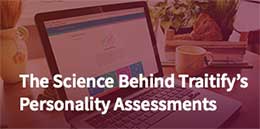You want to hire the best person for the job.
The obvious first step is to scan candidates’ resumes for evidence of their hard skills, right? But then comes the interview — for those candidates, that is, whose skills appear adequate or impressive enough for the next step.
But the focus of the interview tends to differ from that of the resume review. The interview serves as an opportunity to get to know the candidates, to try to gain a window into their respective personalities, with the end goal of determining how well they will “fit in” — with other employees, and with the broader company culture. Then, it’s decision time.
What would happen if, before making your final decision about whom to hire, you created a grid and checked off boxes related to two separate categories: skills and personality? Would you weigh each category evenly, choosing the candidate with strengths evenly distributed between the two?

Many say that personality matters more than skill set
According to an extraordinarily revealing study conducted recently, personality trumps skill set during the hiring process most of the time. The study, done in 2013 by digital education company Hyper Island, polled 500-plus leaders across companies in the communication, technology, and business development industries about future challenges and the employee attributes they believed would help meet them.
Here’s what the results looked like. Seventy eight percent of respondents chose “personality” as the quality they most desired in employees. “Cultural alignment” was next; “skill-set”, last. As for the personality traits employers most value, they include — in descending order — “drive”, “creativity”, and “open-mindedness”.
These results may come as a surprise, particularly as they relate to the tech industry, in which skills cannot be overlooked entirely. But the Hyper Island study is not alone in reaching the conclusion that personality matters more than skills when vetting job candidates.
Billionaire businessman Richard Branson, founder of the conglomerate Virgin Group, agrees. Here’s what Branson had to say about the topic in an article he wrote that appeared on LinkedIn:
“The first thing to look for when searching for a great employee is somebody with a personality that fits with your company culture. Most skills can be learned, but it is difficult to train people on their personality. If you can find people who are fun, friendly, caring and love helping others, you are on to a winner.” Richard Branson

Mining for personality
Whether or not you agree that personality is the single most important factor in a good hire, certainly it plays a significant role in the decision making process. So, how can you tell if a candidate has a winning personality? An interview can give you a clue, sometimes. But some people just aren’t strong interview subjects. Mired in anxiety and interview jitters, they may not present as they normally would in a work environment.
That’s why employers are turning to new technologies like Traitify’s Personality API. This psychology-backed assessment comprised of a diverse set of fun visual assessments uncovers personality types and traits, allowing employers to learn about a job candidate’s personality and, in turn, gauge how they will mesh with the company culture — possibly even before they’re hired.
Hiring: A balancing act
Clearly, there’s plenty of proof that personality matters when hiring. But there is more to a great employee than a great personality, many would argue. Consider the input from another successful businessman, Robert Herjavec, founder and CEO of the Herjavec group. Also writing on LinkedIn, Herjavec had this to say about the hiring process:
“I’ve hired for the person, for the job, as a favour — I’ve done it all — but I can tell you that at the end of the day, it’s a balancing act to ensure you get the right mix of passion, drive, expertise, talent, and teamwork that will help your corporate environment flourish.” Robert Herjavec

Herjavec offers a logical approach to hiring, particularly given his emphasis on the term “balancing act”. Of course, most if not all employers strive to hire people whose personalities translate into team players who are driven and passionate about their work. But not all employees can have the same personality, or clashes and potentially unhealthy competition will ensue.
Then there’s the skill piece. Yes, it’s true that some skills can be taught. But it’s downright dangerous or just plain poor judgment to hire someone to be, say, a computer programmer if he or she has zero experience, skills or natural inclination toward programming, or to hire a writer who has all the drive in the world to become a writer — but no idea how to formulate a simple sentence.
No one ever said hiring was easy. Making good hiring choices involves time, patience, introspection, and external input. Even then, what seemed like the perfect candidate can sometimes turn out to be a nightmare employee. But when you put the effort into getting to know a candidate’s personality and skill set prior to making an offer, and balancing these two competing priorities based on your company’s needs, chances are you’ll come up with a winner.
So, does personality trump skill? Take the first step in identifying what personality traits are important to your organization with our assessment.




 Subscribe to Our Blog
Subscribe to Our Blog 
